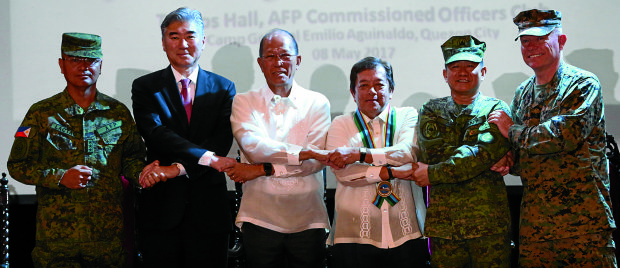PH, US Balikatan exercises open with fewer troops
[ventuno id=’OTMxODIwfHwyMzY4fHwxMDg2fHwxLDIsMQ==’][/ventuno]
The annual military exercises between the United States and the Philippines, called “Balikatan [shoulder-to-shoulder],” opened in Quezon City on Monday, but on a smaller scale, amid the government’s declared pivot to China and Russia.
Defense Secretary Delfin Lorenzana led the opening ceremonies of the 33rd Philippine-US Balikatan military exercises at Camp Aguinaldo.
Exercise Balikatan 2017, which will run from May 8 to 19, was scaled down from almost 10,000 soldiers last year to 5,400 troops but will also include 80 troops from Australia, 20 from Japan and observers from Southeast Asian countries.
The trainings will be held in Fort Magsaysay, Nueva Ecija; Casiguran, Aurora; Upi, Isabela; Guiuan, Eastern Samar; and Camp Aguinaldo in Quezon City.
“Let us [keep] in mind that we are doing this exercise as a tool for peace-building … May the United States and Philippines continue to have stronger ties and bilateral relationship. Allow me to express my appreciation to the US troops who are here. We are thankful for your demonstration of friendship and goodwill,” Lorenzana said.
“Balikatan is obviously a very important military exercise. But from my perspective, it’s more than that,” said US Ambassador Sung Kim.
“Balikatan is a very special meaningful embodiment of our robust bilateral relationship and reflects not only our strong military partnership but also the deep friendship between our two peoples,” Kim added.
This year’s exercises will focus on humanitarian aid and disaster response (HADR) and counterterrorism, compared to last year’s emphasis on territorial defense.
“The political authorities provide us guidance. The priority of [President Duterte] is HADR and counterterrorism so that’s the thing we are focusing [on],” said Lt. Gen. Oscar Lactao, codirector of the exercise for the Philippines.
Lt. Gen. Lawrence Nicholson, the exercise codirector for the US, said American soldiers were not disappointed with the scaled-down exercises.
“I can tell you that every Marine, sailor, soldier that’s coming for the exercise are not disappointed,” Nicholson said.

BALIKATAN OPENING (From left) Balikatan 2017 codirector Lt. Oscar Lactao of the Armed Forces of the Philippines, US Ambassador Sung Y. Kim, Defense Secretary Delfin Lorenzana, Foreign Undersecretary Ariel Abadilla, AFP Chief of Staff Gen. Eduardo Ano and Lt. Gen. Lawrence D. Nicholson of the US Marine Corps link arms during the opening ceremonies of Balikatan in Camp Aguinaldo. NIÑO JESUS ORBETA
“Again, the scope of this year’s exercise has changed and HADR and counterterrorism are two critically important areas of concern for both of our nations, for all other nations,” he said.
“I think there’s a lot of work to be done. There’s a lot of sharing of techniques, tactics and procedures so we’re excited by the work that we’re going to do, and [we] think in the years ahead there will be different focuses for Balikatan,” Nicholson added.
The exercises were scaled down on the orders of
Mr. Duterte, who was angered by US criticism of his war against drugs.
During his visit to China last year, Mr. Duterte also said he wanted to chart a more independent foreign policy from Washington.
But Foreign Affairs Undersecretary Ariel Abadilla said the defense cooperation between Manila and Washington was “not aimed at any particular country.”
“The defense cooperation between the Philippines and the United States is a longstanding arrangement not aimed at any particular country or group of countries,” Abadilla said. —WITH A REPORT FROM AFP
